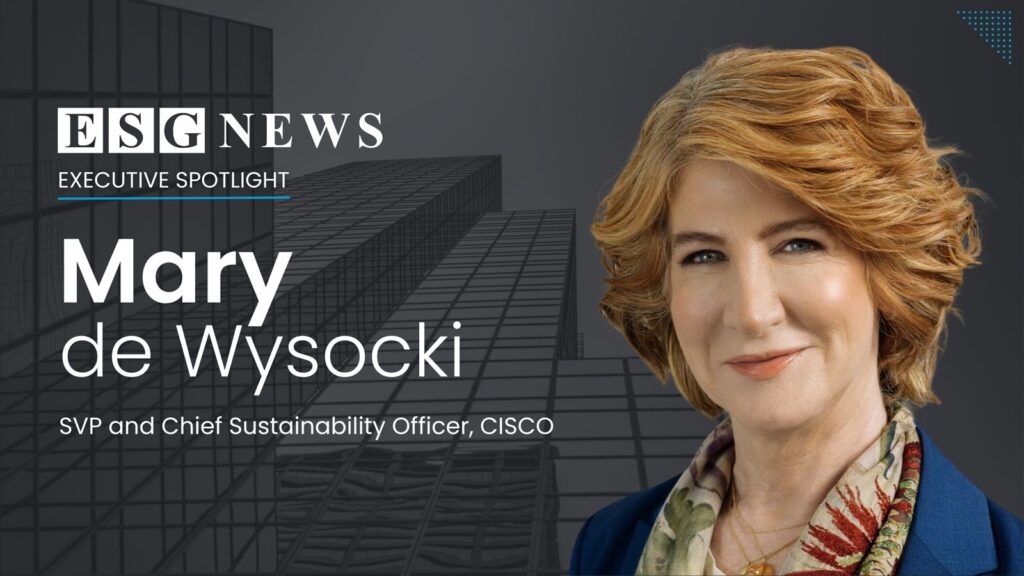Exclusive Interview: A Conversation with Mary de Wysocki, Chief Sustainability Officer at Cisco

By Michael Fabiano and Matt Bird, April 26, 2024
Question: What factors contribute to the remarkable willingness to adapt to change within the organization?
Answer: I believe this willingness stems from a combination of factors. Firstly, it involves honoring our past by building on the foundation of investments made since 2005. Secondly, it requires a commitment to learning and development, ensuring that individuals are equipped with the skills needed for the next level. One key aspect is translating ESG (Environmental, Social, and Governance) initiatives into language that resonates with the entire company, thus accelerating adoption. My diverse experiences, transitioning from a systems engineer to corporate business consulting, have underscored the importance of effectively communicating at all levels of the organization. Motivating individuals to embrace shifts and changes varies for each person, necessitating tailored approaches such as implementing new governance structures for review processes. Additionally, having witnessed the evolution of mainstream interest in ESG over the years, it’s evident that our proactive approach to infrastructure development has positioned us well for navigating uncertainties and maintaining a competitive edge. Overall, prioritizing continuous improvement and capability development remains integral to our success in this dynamic landscape.
Question: With your extensive experience in driving change for social good, what do you believe are some of Cisco’s most impactful attributes or “superpowers”?
Answer: I’d say one of our advantages lies in having a first-mover perspective, rooted in the principles laid down by our founders and leadership team. This early involvement allowed us to shape our initiatives and instilled a sense of responsibility for social impact. Over the past 25 years, we’ve been able to cultivate organizational capacity, particularly through programs like Cisco Networking Academy, which spans globally. Our evolution within the Cisco Foundation reflects our ongoing efforts to adapt and address pressing challenges, such as incorporating diversity criteria into our grant-making and venturing into impact investing. Networking, both in terms of technology and human connections, has been pivotal in driving large-scale change. Significant investments, both corporate and personal, have fueled initiatives like our $50 million commitment to combating homelessness. Moreover, our organizational culture, emphasizing accountability and continuous improvement, has been critical to our success. We’ve learned to leverage business intelligence practices and reporting frameworks to measure and communicate our positive impact effectively. Programs like the Country Digital Acceleration program underscore our commitment to collaborative problem-solving on a global scale, recognizing the importance of building human capital and fostering favorable business conditions. The increasing focus on sustainability at the board level further validates the significance of our efforts. Ultimately, I believe it’s the combination of these factors, coupled with a commitment to nurturing leadership and fostering a culture of innovation, that drives enduring success.
Question: The evolving role of companies, especially regarding sustainability, seems to mark a significant historical shift. However, do you think the average person truly comprehends the implications of these changes, or is it mainly a concern for business professionals and investors?
Answer: Initially, when discussing trust, governments often held the highest levels, followed by companies. However, during events like the COVID pandemic, employees looked to their employers for leadership. Regarding sustainability, our journey includes a commitment to incorporating circular design principles into all of our new products and packaging by our fiscal year 2025. This has involved comprehensive training for engineers and a systematic approach to product assessment and improvement. What’s notable is how sustainability has transitioned from being managed by specific teams to becoming a top-level discussion. So, ensuring accountability at all levels becomes crucial for driving meaningful change. Overall, the evolving role of companies, especially in sustainability, indeed marks a profound shift, one that requires effective communication to both business stakeholders and the broader public.
Question: How do you view the concept of incorporating emissions and environmental impact into product information, similar to how calorie counts are displayed on menus, as discussed in the conversation?
Answer: This shift in perspective from focusing solely on what’s inside the food to considering the broader environmental impact of products represents a significant change. In my conversations, we’ve delved into the concept of carbon footprints and the need to translate complex concepts into digestible information for wider consumption. Additionally, there’s a recognition of the shift in focus towards shorter-term strategies, contrasting with traditional long-term planning approaches. This shift underscores the urgency of addressing environmental challenges and the need for adaptable strategies. We’ve also discussed the importance of patient capital in driving sustainable solutions, alongside the necessity of rigorous research and evaluation to demonstrate effectiveness. Furthermore, the conversation has touched on the international dimension, highlighting the role of the Sustainable Development Goals (SDGs) in fostering global collaboration and equalizing opportunities. Overall, there’s a recognition of the transformative power of incorporating environmental considerations into business practices and the need for concerted efforts to drive positive change on a global scale.
Question: How do you envision addressing the generational gaps in understanding sustainability, particularly in terms of financial reporting and market access issues?
Answer: Our decision to set a goal to reach net zero emissions by 2040 was largely influenced by customer and colleague expectations, particularly in the U.S. and UK. However, transitioning sustainably presents multifaceted challenges, both internally and externally. From a tactical standpoint, aligning internal and external expectations is crucial. Reflecting on our approach, I see the value in convening stakeholders to collectively agree on goals and investment strategies. This collaborative approach fosters economic viability and signals demand for sustainable solutions. Additionally, leveraging research capabilities within organizations like Cisco can enhance impact frameworks and foster a culture of information sharing and healthy competition. As we navigate the complexities of sustainability, we must remain adaptable to unforeseen variables, such as shifts in political landscapes, which can impact long-term strategies. Ultimately, building a compelling business case for sustainability requires careful consideration of diverse factors and a willingness to adapt to evolving circumstances.
Question: How do you reconcile the transition from sustainability goals being aspirational to becoming mandatory requirements, especially in terms of reporting and compliance?
Answer: Your observation is spot-on and raises a crucial point. Previously, our sustainability goals, while ambitious, served as rallying cries for action, inspiring momentum and engagement. However, as we shift towards mandatory reporting and compliance frameworks, there’s a notable shift in perspective. Goals that were once aspirational now require concrete plans and accountability measures. This transition introduces a tension between the aspirational nature of our goals and the practicalities of compliance and risk management. While the incorporation of financial compliance standards into sustainability initiatives enhances rigor and transparency, it also demands a higher level of accountability and scrutiny. Balancing these dual perspectives, and navigating uncertainties such as changing policies and regulations, adds complexity to the sustainability landscape. Ultimately, while the shift towards mandatory reporting brings clarity and accountability, it also underscores the need for a pragmatic approach to goal-setting and implementation.
Question: Do you perceive company metrics for sustainability, particularly regarding net zero goals, as still in their early stages of development, or is it more dependent on individual company practices?
Answer: It’s a mixture of all of the above. When we consider metrics for net zero goals, there’s varying levels of reliability and granularity. For instance, tracking energy consumption within our own workplace is relatively straightforward and concrete. However, when we delve into Scope 3 emissions, which encompass indirect emissions like those from customer activities, estimation becomes more challenging. Nevertheless, it’s essential to include these metrics in our sustainability assessments, even if they’re conservative estimates. This approach prompts deeper reflection and consideration, ultimately enhancing the integrity of our goals. Additionally, the terminology around these targets, whether they’re termed as goals or targets, can sometimes be ambiguous, necessitating clarity and precision in our planning. Overall, while there’s room for improvement, investing in resources and fostering participation within our ecosystem, including stakeholders like Cisco, is vital for advancing sustainability metrics and practices.
Question: What are some areas that have lagged behind in terms of addressing sustainability, and how do you envision navigating these challenges?
Answer: When considering the transition to a more sustainable future, there are several dimensions to explore. Firstly, there’s a fundamental shift required in our mindset, from our current lifestyles to the changes necessary for the world we’ll inhabit in the next decade. This encompasses reevaluating conveniences we take for granted, such as rapid delivery services and considering the environmental impact of these conveniences. For instance, are we willing to sacrifice immediate gratification for a lower carbon footprint? Personal experiences, like enduring a week without heating or hot water, shed light on the adjustments needed for a more sustainable lifestyle. Additionally, addressing disparities in resource access and collective action is paramount. While privileged individuals may have the resources to adapt, there’s a broader challenge in fostering collective action across communities and industries. The question arises: how do we incentivize such collective action, especially within the current frameworks of corporate and public sector accountability? It requires a concerted effort from all stakeholders to prioritize sustainability as a collective goal rather than a competitive advantage.
Question: How do you perceive the responsibility of businesses towards conservation efforts, and what strategies can be employed to incentivize conservation?
Answer: Absolutely, responsible business practices are crucial in addressing conservation challenges. One approach involves reframing consumerism and promoting conscientious consumption as an action for the greater good. Additionally, incentives play a significant role in motivating individuals and organizations to prioritize conservation efforts. We need to find ways to connect present actions with future outcomes, emphasizing the collective impact of individual choices on creating a better future. Effective communication and leading by example are key in inspiring action and driving tangible results. Business leaders can also play a pivotal role by integrating conservation principles into their operations, employee benefits, and community engagement initiatives. Ultimately, fostering a culture of purpose-driven decision-making and accountability is essential for advancing conservation efforts globally.
Question: Have you conducted any generational studies regarding attitudes towards sustainability, particularly among Generation Z?
Answer: Indeed, we’ve observed a significant shift in attitudes, especially among Generation Z, where sustainability is perceived as a fundamental value rather than a political stance. For instance, many individuals within this demographic prioritize environmental considerations in their career choices, reflecting a deep-seated commitment to sustainability. This trend underscores the importance of understanding and accommodating these evolving perspectives, particularly among those in positions of influence in both the public and private sectors, where strategic investments in sustainability are paramount.












